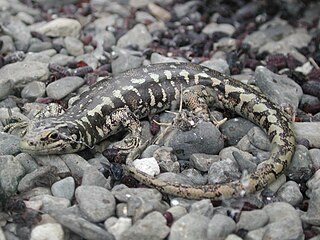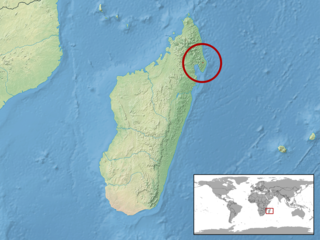
Skinks are lizards belonging to the family Scincidae, a family in the infraorder Scincomorpha. With more than 1,500 described species, the family Scincidae is one of the most diverse families of lizards.

Amphiglossus is a genus of skinks, lizards in the family Scincidae.
Melanoseps is a genus of lizards, known commonly as limbless skinks, in the family Scincidae. The genus is endemic to Sub-Saharan Africa.

The Bermuda skink or rock lizard is a critically endangered species and the only endemic land-living vertebrate of Bermuda. It is a relatively small skink : adults reach an average snout-to-vent length of about 8 cm (3.1 in).

The Otago skink is a rare, endangered species of large skink in the family Scincidae, found in the rocky canyons and grassy patches of Central Otago, New Zealand.

The Korat supple skink or Koraten writhing skink is a species of skink in the family Scincidae. It is endemic to Thailand.

Carinascincus metallicus, the metallic cool-skink or metallic skink is a species of skink in the family Scincidae. It is endemic to Australia, found in southern Victoria, as well as in Tasmania where it is the most widespread and common lizard, occurring on many offshore islands in Bass Strait as well as the mainland. It gives birth to live young. It is highly variable in colour and pattern, and may be a complex of closely related species.

Scincinae is a subfamily of lizards. The subfamily contains 33 genera, and the genera contain a combined total of 284 species, commonly called skinks. The systematics is at times controversial. The group is probably paraphyletic. It is one of three subfamilies of the family Scincidae, the other two being Acontinae and Lygosominae.

The Fiordland skink is a species of skink endemic to the Fiordland temperate forests ecoregion of South Island, New Zealand. The Fiordland skink is found on one mainland locations and the exposed rocky shores of numerous islands along the Fiordland coast. Their distribution has declined due to introduced predators. Currently it lives only on foreshore rocks and boulder beaches on the Fiordland coast. It is abundant, even extremely abundant, in areas free from mammalian predators, but it barely survives where predators are present.

Scincella vandenburghi, also known commonly as the Korean skink, the Tsushima ground skink, and the Tsushima smooth skink, is a species of skink, a lizard in the family Scincidae. The species is endemic to East Asia

Trachylepis punctatissima, commonly called the montane speckled skink or speckled rock skink, is a lizard in the skink family (Scincidae) which is widespread in southern Africa. The common and adaptable species occurs in a variety of habitat types at middle to high altitudes. It was for a time treated as a southern race of the African striped skink, T. striata.

Brachyseps is a genus of skinks. They are all endemic to Madagascar. Some taxonomic authorities place the group in the genus Amphiglossus.

The Guinea lidless skink is a species of lidless skinks in the family Scincidae. The species is found on Príncipe, Ilhéu das Rolas, and São Tomé.
There are two species of skink named Boulenger’s tree skink:

Brachyseps anosyensis is a species of skink endemic to Madagascar.

The black-striped skink is a species of skink endemic to Madagascar.

Brachyseps mandady is a species of skink endemic to Madagascar.

Brachyseps punctatus is a species of skink endemic to Madagascar.
Brachyseps spilostichus is a species of skink endemic to Madagascar.

The splendid skink is a species of skink endemic to Madagascar.

















